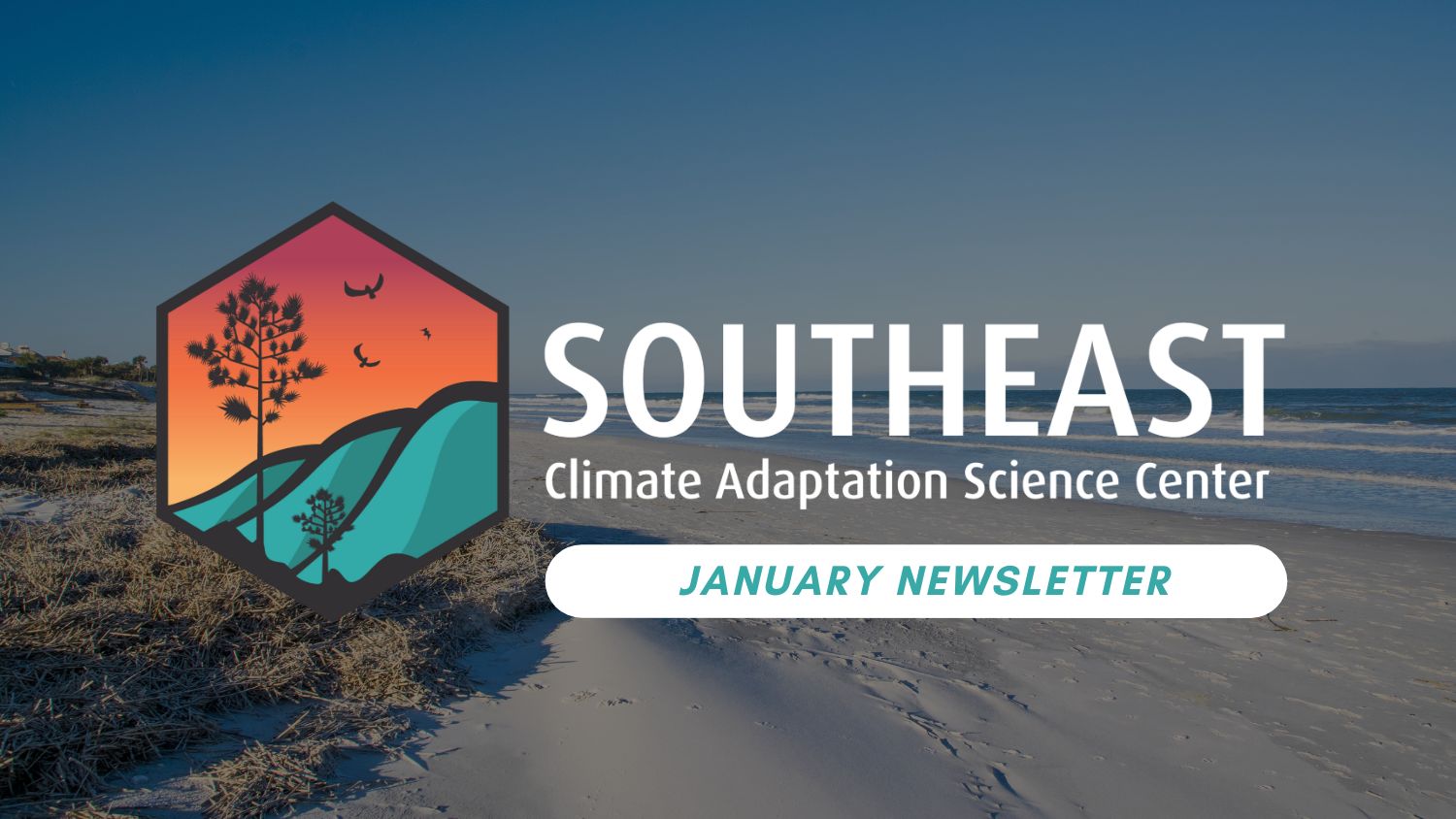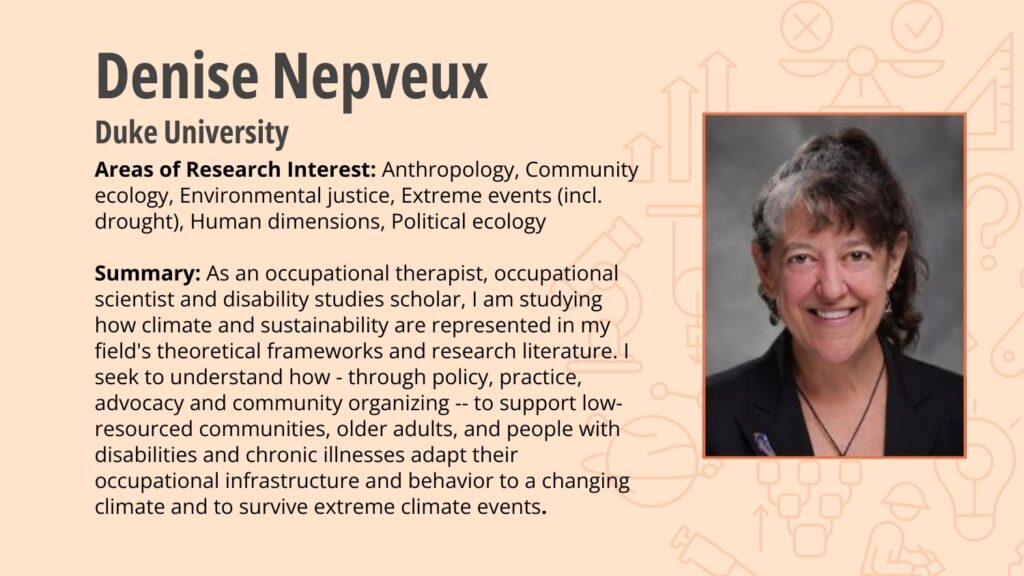January 2025 Newsletter

Get our newsletter in your inbox by subscribing here.
Southeast CASC News
Save the date! The 2025 Southeast Climate Adaptation Science Symposium is scheduled for Sept 9-11, 2025 in Asheville, NC. More details to come.
Join our first science seminar of the year featuring a selection of New Project Lightning Talks on Jan 22 at 1pm ET.
Catch up on the latest Researcher Spotlight from 2024-25 Global Change Research Fellow Hannah Ferraro who shares her research on seagrasses and their important role in carbon sequestration.
2015-16 Global Change Research Fellow, and current research affiliate, Georgina Sanchez explains how the classifications of flood risks may give developers and home buyers a false sense of security.
Paul Taillie, 2016-17 Global Change Research Fellow, details how rising sea levels and urban expansion threatens the endangered silver rice rat in the Florida Keys.
Katie McQuillan, 2019-20 Global Change Research Fellow, has a new paper in Ecohydrology on how interactions between climate and species drive future forest carbon and water balances.
A new article co-authored by Paul Armsworth in Environmental Research Letters explores multi-hazard risk in socially vulnerable communities across the United States.
A NOAA press release highlights a new SE CASC cross-agency collaboration around how coastal erosion and sea level rise are putting Florida’s cultural heritage sites at risk.
Register for our next science seminar Science Needs Related to Harmful Algal Blooms and Climate Change, on Feb 19, 1pm ET.
Research Affiliate Spotlight

View a searchable list of all SE CASC Research Affiliates and find your next collaborator!
Community News from the Southeast
Partners
Global One Health Academy is accepting applications for postdoctoral support awards, due by Jan 26.
The call for abstracts for the NAFWS 2025 Annual National Conference is open until March 7.
Tribal
Visit USET Climate Change Headlines for updates and highlights from across the USET region.
Miccosukee Tribe has signed a co-stewardship agreement with the U.S. Fish and Wildlife for south Florida fish and wildlife refuges.
A Miccosukee tribal elder explains the importance of Everglades to his culture in a video for AP News.
Gatherings
Webinars
- Jan 22 | 1pm ET | SE CASC Science Seminar: New Project Lightning Talks
- Jan 27 | 1pm ET| MW CASC Science Seminar: Climate Impacts on Cultural Resources
- Jan 28 | 1pm ET | Modeling Impacts of Climate Change and Extreme Events
- Feb 19 | 1pm ET | SE CASC Science Seminar: Science Needs Related to Harmful Algal Blooms and Climate Change
- Feb 25 | 3pm ET | Voices of the Past, Planning for the Future: Coastal Resilience and Cultural Preservation in the Apalachicola System
Events
- Jan 30 | (Y)Our Health in the Movies: Climate Change | NC State
- April 14-17 | NAISMA National Forum on Biological Control | Annapolis, MD
- May 12-15 | NAFWS 2025 Annual National Conference | Riverton, WY
Find more events on our calendar.
Resources and Publications
Resources
- SE CASC Glossary- Climate Adaptation. The latest entry to the SE CASC Glossary explores the meaning of climate adaptation and provides a repository of useful tools and resources to dig deeper into the topic.
- EPA EJScreen Multisite Tool. EJScreen is EPA’s environmental justice mapping and screening tool that provides EPA with a nationally consistent dataset and approach for combining environmental and socioeconomic indicators. This tool allows you to evaluate multiple regions at once through an environmental justice screen.
- Climate change solutions. This tool from Yale Climate Connections offers resources for individual actions to take to reduce pollution, and ways to start conversations with those in your community.
Publications
Near-term ecological forecasting for climate change action. Nature Climate Change
The authors argue that as the pace of ecological change accelerates, previous methods of prediction that rely on historical models are rapidly becoming outdated. Instead, they propose the use of near-term ecological forecasting. This works iteratively on much shorter timescales to anticipate and respond to ecological change at the speed that is most relevant for environmental management. Recent technological advances have improved predictive capacity, and to continue this improvement, the authors highlight the importance of building up a workforce, and cross-disciplinary partnerships beyond the academic realm.
Asymmetric impacts of climate change on thermal habitat suitability for inland lake fishes. Nature Communications
Freshwater fish species in lakes are being unevenly impacted by changes in temperature. Unlike their saltwater counterparts, freshwater fish cannot move to a different water column when the temperature of their previous habitat changes. Cooler-water species are losing the number of preferred days faster than warmer-water species are gaining them. This has important implications for freshwater fisheries management and could result in a net loss of freshwater fish as warmer-water species may not make up for the loss of cooler-water fish.
Informing proactive wildfire management that benefits vulnerable communities and ecological values. People and Nature
In this article, the authors compared spatial models that estimated wildfire mitigation potential that did and did not include social and ecological considerations. They found that the models that included those considerations improved the representation of areas with particularly high social vulnerability and/or ecological value in their fire mitigation efforts. This has important implications for how wildfire mitigation focal areas are prioritized.
Integrating counts from rigorous surveys and participatory science to better understand spatiotemporal variation in population processes. Methods in Ecology and Evolution
In this article, the authors propose a model to understand population variation that incorporates both rigorous survey and participatory science data. This allows for a better understanding of population processes at broad spatiotemporal scales. Through a case study they found that this model was more precise than a model with rigorous survey data alone. They also found this model to be flexible to accommodate different ecological systems and survey methods.
Opportunities
Student Announcements
PI CASC is accepting applications for their Summer Undergraduate Research Fellowship. Due by Jan 24.
Applications are open for the 2025 Native Youth Community Adaptation and Leadership Congress. Due by Feb 28.
NOAA is accepting applications for their Coastal Resilience Fellowship Program. Due by Feb 28.
NW CASC is accepting proposals for their Research Fellowship Program to support graduate students or post-doctoral scholars. Due by March 10.
Hiring Announcements
NW CASC is seeking a postdoctoral scholar to conduct research on quantifying and informing management of coastal squeeze. Apply by Feb 1.
NAFWS is hiring a Deputy Executive Director. Apply by Feb 7.
The Hive Fund for Climate and Gender Justice is hiring an Administrations and Operations Fellow. Apply by Feb 28.
NCEAS is seeking two postdoctoral fellows for their Gulf Ecosystem Initiative. Apply by March 14.
Duke is hiring a Climate Communications Specialist. Open until filled.
Funding Announcements
Global One Health Academy is accepting proposals for Local Engagement Seed Grants. Due by Jan 26.
Climate Science Alliance is accepting LOIs for the 2025 Giving Cycle grants. Due by Feb 1.
NSF is soliciting proposals for Partnership to Advance Conservation Science and Practice funding. Due by March 3.
NOAA Fisheries seeks proposals for Transformational Habitat Restoration and Coastal Resilience Grants. Due by April 16.
NOAA Fisheries seeks proposals for Coastal Habitat Restoration and Resilience Grants for Tribes and Underserved Communities. Due by May 12.
- Categories:
